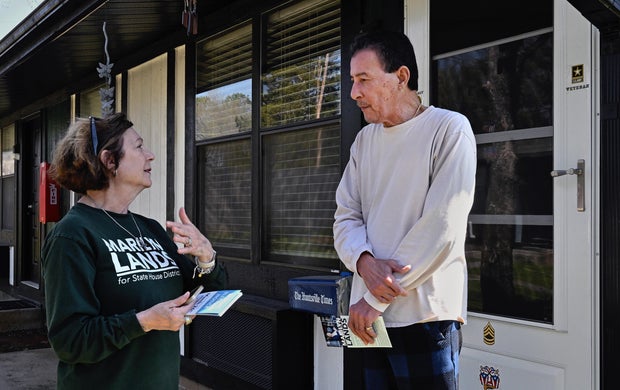NEW YORK — As abortion access and reproductive rights hang in the balance for many women in this country, we take a look at the personal impact of these hard-earned rights and the possibility some face of losing them.
Annie Trombatore Peltzer snuggles her eldest child Rhodes and her newborn daughter Lila, who was born 6 months ago with the help of invitro fertilization, or IVF.
“Life-changing for sure. And life-changing for her. She wouldn’t be here,” Peltzer said.
In 2016, at 26 years old, Peltzer knew she wanted children, but not right then — so she underwent the grueling process of hormone injections and egg retrieval to freeze embryos with the man who would become her husband.
“Fast forward to getting pregnant with Rhodes, and it happened naturally. We didn’t need to use it. Then just this last year, when trying to conceive with her, we tried for about a year, no success, so we were really happy that we had made those choices,” Peltzer said.
But Peltzer’s story is one that has only been possible for around 40 years, and one that might no longer be possible for women in places like Alabama, where IVF is in limbo after that state’s Supreme Court ruled embryos are human beings.
From abortion restrictions to bans on IVF, reproductive rights for women in the United States have never been more uncertain.
“This idea of choice — who even has a choice, right? People who want to parent might not have really the choice to be able to parent,” said Dr. Wendy Schor-Haim, with Barnard College.
Schor-Haim and Dr. Cecelia Lie-Spahn, also with Barnard, are experts in the history of reproductive rights in the U.S. and say this country has a long history of controlling women by controlling their bodies.
“One of the biggest, most important acts of resistance for enslaved women was being able to keep the children that they had because they were so often sold to other slave holders. So I think about this kind of broader historical context in Alabama and how once again, we have this situation where people are told who can have a family, who cannot,” Lie-Spahn said.
Schor-Haim says the tipping point in the way abortion was perceived came with the formation of the American Medical Association, initially run solely by men.
“What’s interesting is that first came the male control, and then came the stigmatization of abortion. So it’s not like there was a national American, you know, popular tide turning against abortion at the time that abortion began to be really restricted. The restrictions caused the stigmatization,” she said.
After years of tireless protests and lobbying, in 1973, the Supreme Court issued its landmark decision in Roe v. Wade, protecting a woman’s right to choose to have an abortion.
According to the Bureau of Labor Statistics, in 1970, the workforce was comprised of 43% women. By 2019, that number had jumped to 57.4%. Scholars say one of the biggest factors credited for that spike in female employment was a woman’s right to control her fertility.
In 2022, the court overturned Roe, giving states the right to choose. In the year since, 21 states have banned or restricted abortions.
“It’s like a runaway train, and people think that they’re controlling it … Women are going to pay the price. Women are like the football in the football game, and it’s really scary to think about,” Schor-Haim said.
“I think we want this world in which people can thrive, and if you don’t have the ability to make choices, can you really [thrive]? Not at all. I think beyond that, then there’s like the real visceral horror of people who, it’s their only way to get pregnant and have that dream taken away from them. That’s a really scary feeling,” Peltzer said.
Providers in Alabama have resumed some IVF services after the state’s Republican governor signed a bill into law earlier this month protecting patients and providers from legal liability.

